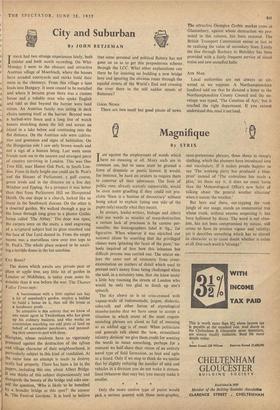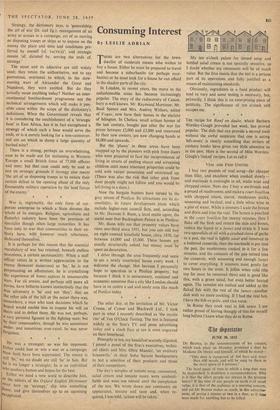Magnifique
By STRIX
T AM against the employment of words which have no meaning at all. Many such are in common use, but to some must be granted a form of dramatic or poetic licence. It would, for instance, be hard on orators to require them to construe all their utterances. The lives of public men, already scarcely supportable, would be even more gruelling if they could not pro- claim 'Siam is a bastion of democracy' without being asked to explain (using one side of the paper only) exactly what they meant.
In orators, leader-writers, bishops and others who use words as missiles of mass-destruction a certain lack of precision is by custom per- missible; the lexicographers label it 'fig.,' for
figurative. When whoever it was enriched our
national idiom by asserting that the privileged classes were 'grinding the faces of the poor,' no- body inquired of him how this inhuman but difficult process was carried out. The orator en- joys the same sort of immunity from cross- examination on matters of detail which used to prevent one's nanny from being challenged when she said, in a minatory tone, that she knew many a little boy roaming the streets of London who would be only too glad to finish up one's spinach.
The sky above us is so criss-crossed with vapour-trails of todomantade, jargon, dialectic, sales-talk and other forms of etymological mumbo-jumbo that we have come to accept a situation in which many of the most cogent- sounding phrases are about as full of meaning as an addled egg is of meat. When politicians and generals talk about the 'new, streamlined infantry division' we give them credit for wanting the words to mean something, perhaps for a moment we half-share their vision of an entirely novel type of field formation, as lean and agile as a lizard. Only if we stop to think do we realise that by slightly reducing the number of men and vehicles in a division you do not make it stream- lined (Whatever that may be); you merely make it smaller.
Only the more costive type of purist would pick a serious quarrel with those semi-graphic, semi-pretentious phrases, those sheep in sheep'a clothing, which the planners have introduced into our vocabulary. If it makes people happier to say The working party has produced a blue- print' instead of 'The committee has made a plan,' let them say it; it does no more harm than the Meteorological Office's new habit of talking about 'the general weather situation' when it means 'the weather.'
But here and there, out-topping the rank jungle of our usage, stands an immemorial tree whose trunk, without anyone suspecting it, has been hollowed by decay. The word is not obso- lete, has not been compromised by misuse, still seems to have its pristine vigour and validity; yet it describes something which has so altered its character as to cause doubt whether it exists at all. One such word is 'strategy.' Strategy, the dictionary says, is 'generalship, the art of war (lit, and fig.); management of an army or armies in a campaign, art of so moving or disposing troops or ships as to impose on the enemy the place and time and conditions pre- ferred by oneself (cf. TAcrics)'; and strategic means 'of, dictated by, serving the ends of, strategy.'
The noun and its adjective are still widely used; they retain the authoritative, not to say portentous, overtones to which, in the slow- moving wars of Alexander the Great and Napoleon, they were entitled. But do they actually mean anything today? Neither an inter- continental bombardment programme nor the technical arrangements which will make it pos- sible come within the scope of the dictionary's definitions. When the Government reveals that it is considering the establishment of a 'strategic base' in East Africa, has it in fact excogitated a strategy of which such a base would serve the ends, or is it merely looking for a non-controver- sial site on which to dump a large quantity of barbed wire?
There is a strong, perhaps an overwhelming, case to be made out for stationing in Western Europe a small British force of 77,000 officers and men; bu.t that case could only be said to rest on strategic grounds if itrategy also meant 'the art of so disposing troops as to ensure their certain defeat in the opening phase of the only foreseeable military operation by the land forces of the enemy.'
* * * War is, regrettably, the only form of cor- porate enterprise to which a State devotes the Whole of its energies. Religion, agriculture and (latterly) industry have been the province of Specialist though often large minorities. It has been only to war that communities in their en- tirety have, with however much reluctance, dedicated themselves.
It is perhaps for this reason that the essential vocabulary of war has retained, beneath endless accretions, a certain sacrosanctity. When a staff officer refers in a written appreciation to the enemy (however numerous) as 'he,' he is not Perpetuating an affectation; he is crystallising the experience of homo sapiens in innumerable Wars. For all armies, and perhaps still more all navies, have hitherto known instinctively that the true adversary is 'he' and not 'they'; that on the other side of the hill or the ocean there was, somewhere, a man who took decisions which he hoped would enable him to impose his will on theirs and to defeat them. He was not, perhaps, it very personal figment to the fighting men; but by their commanders, though he was sometimes i under- and sometimes over-rated, he was never forgotten. * * * He was a strategist; so was his opponent. Either could lose or win a war or a campaign. Now both have been superseded. The enemy is stilt 'he,' we no doubt are still 'he' to him. But he is no longer a strategist; he is an individual Who pushes a button and hopes for the best. Either we need a new word to describe him, or the editors of the Oxford English Dictionary Must turn up 'strategy,' slip into something 1°0se, and give themselves up to an agonising reappraisal.



































 Previous page
Previous page